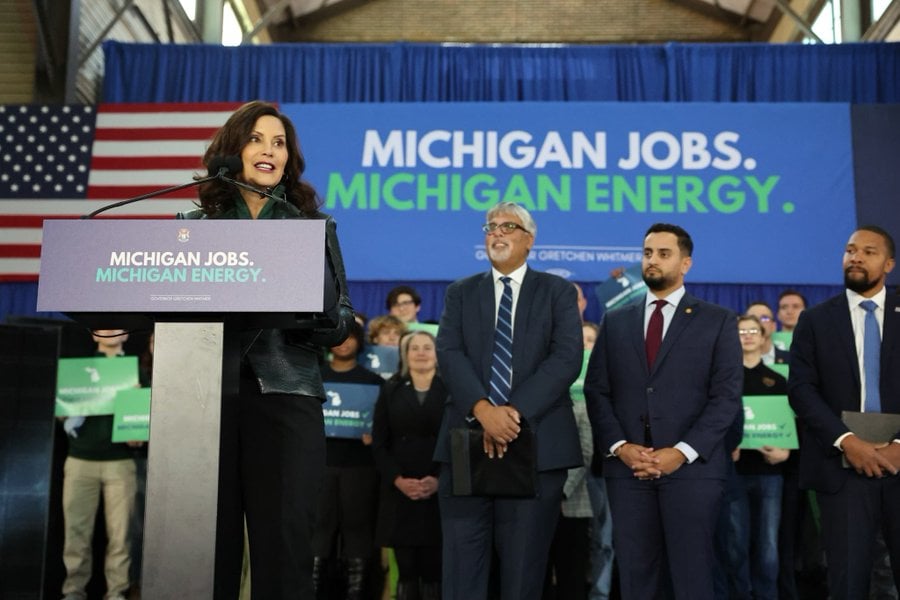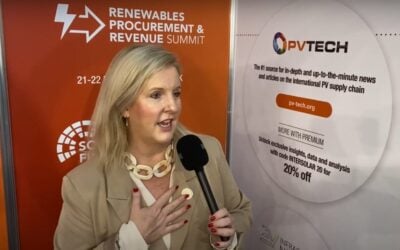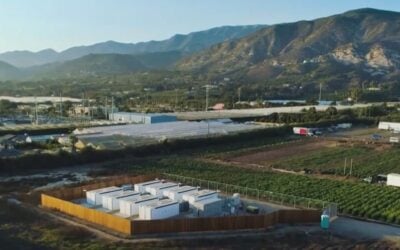
Michigan governor Gretchen Whitmer has signed legislation that sets climate targets for the US Midwest state, including a 100% clean energy standard by 2040 and a 2,500MW by 2030 energy storage target.
The governor signed off on five bills yesterday (28 November) called the Clean Energy Future Plan, which, as reported by our colleagues at PV Tech earlier this month, had passed the state legislature and only required Whitmer’s signing to rubber stamp it.
Enjoy 12 months of exclusive analysis
- Regular insight and analysis of the industry’s biggest developments
- In-depth interviews with the industry’s leading figures
- Annual digital subscription to the PV Tech Power journal
- Discounts on Solar Media’s portfolio of events, in-person and virtual
It means that Michigan is now the 12th state to make such a commitment. The bills include interim requirements for 50% renewables by 2030 and 60% by 2035, before attaining carbon neutrality by 2050. It is also now the 10th US state to put in place an energy storage-specific policy goal or target.
While PV Tech noted that some advocacy groups were unhappy that it included provisions to allow investments into carbon capture and storage that are 90% effective, the American Clean Power Association (ACP) said the plan would not only secure the state’s clean energy future, but also put it in the position to benefit from job creation, tax revenue and investment into renewables.
Most of the new legislative package was based on the MI Healthy Climate Plan that governor Whitmer had put forward in April 2022, including the need for an energy storage target. In March this year, that target solidified into House Bill 4256, which proposed the 2,500MW by 2030 goal and was backed by 20 Democrat lawmakers.
‘Leader in Midwest clean energy adoption’
Michigan is “now leading the US Midwest in clean energy adoption,” Jeff Bishop, the CEO of energy storage developer-owner Key Capture Energy (KCE) told Energy-Storage.news in an interview this morning.
“We’re going to be seeing legislation like this all throughout the Midwest, and Michigan is just going to be the start.”
KCE operates a portfolio of operational large-scale battery energy storage system (BESS) projects in Texas and New York. In 2021, Bishop had told this site the Midwest region, specifically the MISO grid territory that encompasses all or part of 15 states including Michigan, had strong fundamentals to be one of the next big storage markets.
The company’s modus operandi is to seek out markets that it thinks will be big in three to five years’ time, and planting its flag in them, and for that reason the developer is already working on potential projects within Michigan that it began developing in around 2020.
“Today we have 700MW of projects in various stages of development [in Michigan], and are really excited to be able to compete to provide battery storage as part of this 2,500MW goal by 2030.”
“MISO overall just needs more capacity. Looking at all the coal plant retirements, even the natural gas plant retirements that are in integrated resource plans [of utilities], they just need more capacity. Whether that’s Illinois, whether that’s Minnesota, whether that’s Indiana, the region is going to be needing standalone battery storage projects,” Bishop said.
As to what that storage might look like, it’s a little early to tell, but MISO, which added energy storage to its market portfolio fairly recently, incentivises 4-hour duration projects, and that will likely be what most parties including KCE target, Bishop said.
In April this year, Energy-Storage.news Premium interviewed MISO VP of system planning and competitive transmission, Aubrey Johnson, on what the transmission and wholesale market operator saw as the main challenges in integrating growing volumes of energy storage resources onto its grid.
Energy-Storage.news Premium subscribers will be able to read the full interview with KCE’s Jeff Bishop in the coming days.
Energy-Storage.news’ publisher Solar Media will host the 5th Energy Storage Summit USA, 19-20 March 2024 in Austin, Texas. Featuring a packed programme of panels, presentations and fireside chats from industry leaders focusing on accelerating the market for energy storage across the country. For more information, go to the website.






